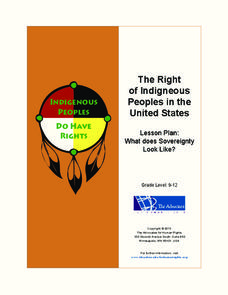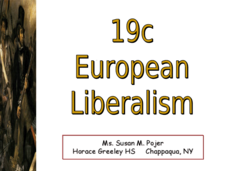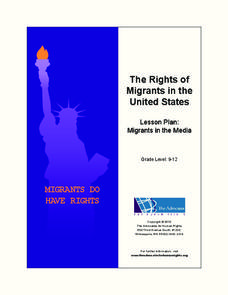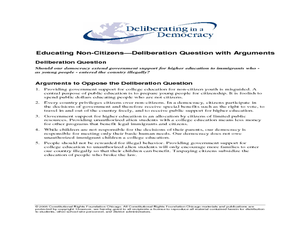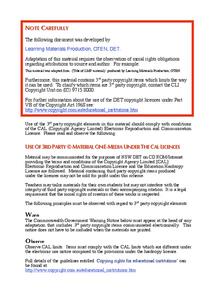Curated OER
Chapter 39: The Economics of Developing Countries
The disparity between the standards of living in industrialized countries versus developing countries has gotten wider - and this presentation can help your class learn why. With a multitude of key definitions and facts, these slides go...
Curated OER
Statehouse Time Capsule
Fourth graders create a time capsule that is representative of their community. They explain why the chosen objects are representative of themselves or their community.
Curated OER
The President's Roles and Responsibilities: Communicating with the President
Students examine the roles and responsibilities of the U.S. president and their own roles as citizens of a democracy. They explore various websites, listen to a State of the Union address, and write a letter to the President of the...
Advocates for Human Rights
The Right of Indigneous Peoples in the United States
The sovereignty of U.S. Native American nations is the focus of a resource that asks class members to compare the Right to Self-Determination in the UN Declaration on the Rights of Indigenous Peoples with a fact sheet that details the...
Curated OER
19c European Liberalism
If you'd like to prompt some great discussions in your history class, this presentation will surely get your class talking. Addressing 19th century liberalism in Europe (including influences from England, France, America, and Ireland),...
National Endowment for the Humanities
Revolution '67, Lesson 1: Protest: Why and How
To some people, protesting is as American as apple pie, but the factors that lead to protests can be as confusing to veteran activists as to today's youth. Revolution '67 explores the riots in Newark, New Jersey as a case study. Using...
Curated OER
Napoleon!
Present the life and times of Napoleon to your World History class. This is a very complete slide-show that high-lights the key events, players, and politics that lead to the rise and fall of Napoleon Bonaparte. There are many rich and...
Curated OER
A Lesson To Accompany "The First Bank of the United States: A Chapter in the History of Central Banking"
Here is an interesting topic. Learners examine the economics that led to the founding of the First Bank of America. They participate in a reader's theater experience depicting the debate between Alexander Hamilton and Thomas Jefferson...
Deliberating in a Democracy
Free and Independent Press
Young scholars determine how free press principles can be compromised. For this global studies activity, students read an article titled "Free and Independent Press." Young scholars respond to discussion questions regarding the article.
Advocates for Human Rights
Migrants in the Media
Class members examine two documents—The Universal Declaration of Human Rights and The Rights of Migrants in the United States—and then use reports in the media to assess how well the US is doing in ensuring these rights.
Deliberating in a Democracy
National Service
Uncle Sam wants you to serve! Scholars investigate the role of mandatory national service in an open democracy. They research, watch a video, and hold a debate surrounding the issue of requiring one year of service to gain a better...
K12 Reader
The Magna Carta
A passage about the Magna Carta provides readers with an opportunity to demonstrate their ability to identify the main idea and supporting ideas in an article.
Children's Commissioner for Wales
Know Your Rights!
Children around the world enjoy a list of rights that protect their bodies, minds, families, and lifestyles. Review the United Nations Convention on the Rights of the Child with learners of all ages, and teach them all about their rights.
Curated OER
The Supreme Court: The Judicial Power of the United States
Students investigate some basic facts about the Supreme Court by examining the United States Constitution and one of the landmark cases decided by that court. The operation of the Supreme Court forms the focus of the lesson.
Deliberating in a Democracy
Educating Non-Citizens
High schoolers distinguish between the privileges of being a U.S. Citizen and privileges that are forfeited if not a U.S. Citizen. For this history lesson, students analyze the rights of people in a democratic society through research,...
Curated OER
World War II - The Holocaust
The Holocaust is the focus of this world history PowerPoint. Viewers are presented with important facts regarding the Holocaust, and the rise of Nazi Germany. They must answer questions such as: "Describe Nazi anti-Semitism in the...
Millennium Schools
Lifestyle Chemistry
My name is Bond, Hydrogen Bond. Written for distance scholars working on chemistry at the high school level, the lesson includes eight weeks worth of material divided into six parts: substances you use, mixing it up, your skin, what's...
Deliberating in a Democracy
Globalization and Fair Trade
Have you ever traded something? How do you know you got a good deal? Scholars use case studies and research to determine the role of globalization in fair trade. Class members examine consumer demand and competition bring to light the...
Center for Civic Education
What Does Returning to Fundamental Principles Mean?
Looking for materials for your Constitution Day and Citizenship Day lessons? Then check out this packet of activities that not only gets your class members thinking critically about the fundamental principles at the heart of American...
K12 Reader
Responsibilities of Citizenship
Your pupils are all citizens of your classroom. Provide some more instruction on how people can be citizens with the reading passage included here. After reading, learners answer the five related questions.
Curated OER
What is Meant by Returning to Fundamental Principles?
What did the Founding Fathers mean by the importance of continually returning to fundamental principles? Your young historians will analyze a series of quotations illustrating the fundamental ideals and principles of the United States...
James Madison Memorial Fellowship Foundation
Those "Other Rights:" The Constitution and Slavery
Did the United States Constitution uphold the institution of slavery, or did it help to destroy it? Young historians study Article 4, Section 2, Clause 3 of the Constitution and evaluate the rights of slaveowners as they compared to or...
Constitutional Rights Foundation
Federal Policy and Immigration
How is federal policy established? To gain insight into this complex and often messy process, class members read an article that uses information on attempts to establish public policy in immigration to illustrate the role proposed...
Curated OER
Baseball Challenge: Social Studies TCAP
Using a baseball theme, this presentation provides a review of social studies topics covered in sixth grade. Students play a game in which they score based on the answers to various questions involving Ancient Rome, Ancient Greece, map...





